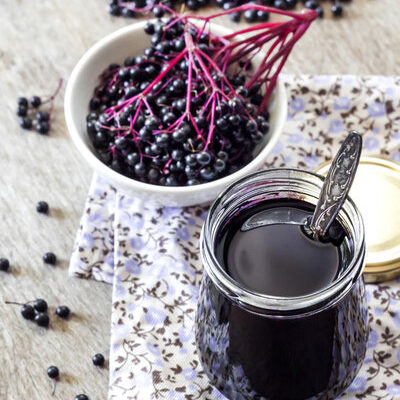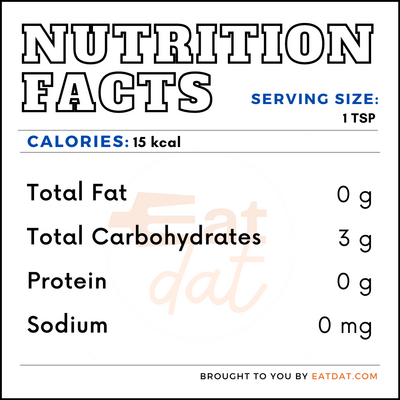
Elderberry Syrup
What is Elderberry Syrup?
Elderberry syrup is made from dried elderberries and may contain honey, lemon, and different herbs. It is often used as a sweetener and is also used extensively as a traditional medicine for colds and flus. Elderberry is the fruit of the elder plant or Sambucus nigra, which is considered an overgrown shrub or a small tree.
- The elderberry fruits are deep blue or purple, which come from anthocyanins, a group of phenolic compounds.
- The berries must be cooked before consumption as they are poisonous.
The top 10 most popular elderberry syrup brands are:
- Gaia Herbs Black Elderberry
- NOW Foods Elderberry Extract
- Nature’s Sunshine Elderberry Immune
- Amazon Elements Elderberry Complex
- BlueBonnet Elderberry Fruit Extract
- Paradise Herbs Elderberry
- Solaray Elderberry
- GNC Herbal Plus Elderberry Fruit
- Planetary Herbals Full Spectrum Elderberry Extract
- Eclectic Institute Elderberry Immune
Origin of elderberry syrup
Elderberries have long been used in traditional medicine to cure the common cold and flu in different cultures in Europe, North Africa, and Asia. The tree was brought to the Americas by the colonists. Elder trees are hermaphrodites and may have both male and female parts within the same flower. Native Americans also use elderberries for healing. Elderberry was used as a medicine in ancient Greece, and Hippocrates called elderberry “nature’s medicine chest”. It was considered a holy tree in the Middle Ages.
Nutrition
One teaspoon of elderberry syrup contains:

Elderberries must not be eaten raw since they contain cyanogenic glycosides, which are potentially toxic. These compounds may release cyanide during consumption. The toxic compounds degenerate during heat processing, rendering elderberry syrup edible and healthy to consume.
Elderberries have a range of nutritional benefits. Research has shown that elderberries have antibacterial and antiviral properties and can reduce the symptoms of cold and flu. Elderberries also contain vitamin A, B vitamins such as B1, B2, B6, and B9, vitamin C, and vitamin E. Copper, zinc, iron, calcium, phosphorus, and potassium are also available in this fruit. In addition, phytochemicals such as carotenoids, phytosterols, and polyphenols add to the health benefits of elderberries. All these give the fruit antioxidant, antidiabetic, anti-inflammatory, immune-modulating, and antidepressant properties.
Commercial production
Commercially produced elderberry syrup uses elderberries and honey, to which additives such as palm sugar and vegetable glycerin are added. Monoglycerides and diglycerides are also added as stabilizers in order to increase the shelf life of the product. The syrup, once made, undergoes heating to pasteurize it. Finally, it is packaged and sent for distribution. Elderberry syrup can be stored in the fridge for up to six months.
Elderberry syrup recipes
This fruit syrup is used in many different concoctions. Here are a few recipes:
- Elderberry Syrup
- Immune Boosting Smoothie
- Elderberry Rose Ice Cream
- Hugo Cocktail
- Fall Harvest Salad with Elderberry Syrup Dressing
- Oat Porridge
FDA regulations
The FDA regulates elderberries in their different forms. It is strictly stipulated that there is no reliable information available on whether elderberry products are effective. The National Center for Complementary and Integrative Medicine (NCCIH) claims that elderberry may relieve flu symptoms, but the evidence is not strong enough to support its use.
References
Młynarczyk, Karolina et al. “Bioactive properties of Sambucus nigra L. as a functional ingredient for food and pharmaceutical industry.” Journal of functional foods vol. 40 (2018): 377-390. doi:10.1016/j.jff.2017.11.025
https://www.ncbi.nlm.nih.gov/pmc/articles/PMC7185606/
Tiralongo, Evelin et al. “Elderberry Supplementation Reduces Cold Duration and Symptoms in Air-Travellers: A Randomized, Double-Blind Placebo-Controlled Clinical Trial.” Nutrients vol. 8,4 182. 24 Mar. 2016, doi:10.3390/nu8040182
https://www.ncbi.nlm.nih.gov/pmc/articles/PMC4848651
D. Charlebois, Elderberry as a Medicinal Plant
https://www.hort.purdue.edu/newcrop/ncnu07/pdfs/charlebois284-292.pdf
